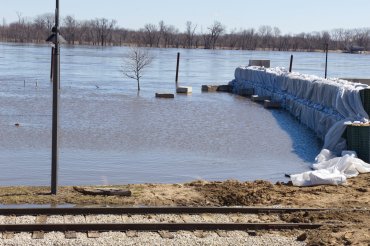
Flooding along the Missouri and Mississippi rivers has forced Midwest lubricant companies to fall back on contingency plans for shipping as railways become submerged, industry insiders said this week.
The deadly floods, caused by record rainfall and snowmelt, have caused billions of dollars in damage and have slowed lubricant shipments because railcars must either wait for the water to recede or take alternate routes to reach their destinations.
Warren Distribution, a private label lubricant blender based in Omaha, Nebraska, saw shipments to its Council Bluffs, Iowa, plant delayed while Union Pacific Railroad placed embargos on railway routes, according to Jim Smith, the company’s vice president of procurement. Shipments to the plant either had to be delivered by bulk truck or through alternate rail lines for products already en route.
The company was still able to get its shipments into the plant.
“We have been able to ship every bit that our customers have ordered from us for our Council Bluffs plant,” Smith told Lube Report. “That doesn’t mean we didn’t get ready with our backup plants.”
Warren Distribution operates manufacturing plants in four locations: Council Bluffs; Guntersville, Alabama; Glen Dale, West Virginia; and Houston. Only its Council Bluffs plant was affected by the floods.
Smith said the company does not use barge shipment on the Missouri River because of the unpredictability of the waters and lack of depth in the water to move barges where Warren Distribution would need them.
“Union Pacific and BNSF Railway placed embargoes – which stop rail traffic in certain areas – forcing railcar shipments already en route to stay in place while the floods happened, preventing any new railcar shipments from being loaded until the embargo was lifted,” he said. “There were also dozens upon dozens of railcars en route to me that when the flood hit, those became stuck, said Smith. So Union Pacific’s priority was to get those cars, wherever they landed when the shutdown happened, moving again, and they moved them across nonstandard rail routes in order to get them into my plant in Council Bluffs, along with many other customers’ rails.”
Warren Distribution is well-versed in dealing with naturally occurring disruptions. Many of the company’s suppliers were impacted by Hurricane Harvey in 2017, and similar railway closures happened during a record snowfall in 2011. “We’ve certainly learned, and we had those contingency plans in place to shift volume really at the drop of a hat if we needed to,” said Smith.
Backup inventory was available to fulfill orders while Warren Distribution waited for its railcars to move again.
Smith said his suppliers are already using railways again, just using different routes than they normally would. For instance, he explained, railcars going out of the Gulf Coast might normally go on a Union Pacific rail line out of Houston right into Council Bluffs, but now they’ll probably divert at Kansas City and go over to Des Moines, Iowa, or even Chicago, where they will interchange with another short line rail hauler who will then bring them west into Council Bluffs.
But ordering bulk trucks to move the inventory that was stuck on idle railcars is still costly. Smith estimated 95 percent of the Council Bluffs plants volume is shipped through rail. There’s a lot of extra costs, he explained. Using bulk trucks instead of rail is a very expensive endeavor. “There’s a lot of extra costs going into this replenishment model in order to satisfy all of our needs,” he said.
While Smith said Warren Distribution had gotten through the worst of its issues related to the floods, Independent Lubricant Manufacturers Association CEO Holly Alfano said that floods could recur, especially since 2018 was the third-wettest year on record in the United States. The ground everywhere is saturated with more rain and snowmelt, she continued. Conditions remain primed for more flooding.
On March 25, Union Pacific released an update to its customers stating it had opened its Columbus Subdivision, from Fremont, Nebraska to Grand Island, Nebraska, with speed restrictions on trains moving on the route. The company advised customers to expect three- to five-day transit time impacts over the next several weeks.
However, the River Subdivision – from Kansas City, Missouri, to Jefferson City, Missouri via Marshall, Missouri – had recently experienced flooding related outages, while the Lincoln Subdivision (Valley, Nebraska to Lincoln, Nebraska) and Falls City Subdivision (Council Bluffs, Iowa, to Kansas City, Kansas) were still experiencing outages. Union Pacific did not have an estimate on when these areas would be open and warned customers that transit times may take three to four days longer than usual since shipments must be rerouted around those areas.
BNSF reported that 10 percent of all of its trains were held last week, about 45 percent higher than the same time last March, according to Alfano.